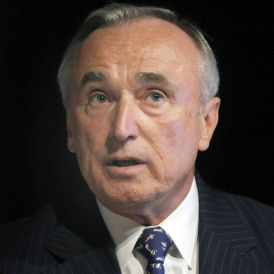Cameron calls for zero tolerance strategy
A row between police and Government threatens to deepen as the Prime Minister says he wants to see US-style crime strategies on the streets of Britain.

David Cameron has said he wants to see US-style “zero tolerance” policing on the streets of Britain in the wake of last week’s riots.
The Prime Minister defended his decision to seek advice from “SuperCop” Bill Bratton on how to avoid a repeat of the disorder, which has led to more than 2,000 arrests around the country.
The move is likely to deepen a rift between ministers and police chiefs who are opposed to the introduction of American crime-fighting methods.
Mr Cameron is due to meet Mr Bratton – a former New York police chief who also dealt with riots in Los Angeles in 1992 – next month.
The Prime Minister indicated that he wanted to learn from the US “zero tolerance” or “broken windows” approach, which sees criminals prosecuted for even low-level crimes and the rapid repair of vandalised property in cities.
We haven’t talked the language of zero tolerance enough but the message is getting through. David Cameron
Mr Cameron said: “We haven’t talked the language of zero tolerance enough but the message is getting through.
“Look how quickly local councils got in there and swept up the glass and actually made sure things were mended and looked better.
“They all know from their own experience that if you leave the broken window, the shop gets looted again. If you leave the bus shelter with graffiti all over it, it gets trashed even further.”
Ian Hanson, of the Greater Manchester Police Federation, said the decision to bring in Mr Bratton was a “slap in the face” for British police, who were angry and disappointed by the move.
The president of the Association of Chief Police Officers, Sir Hugh Orde, said the UK had no lessons to learn from gang-ridden America and indicated that he had opposed the move in talks with the Home Secretary.
I am not sure I want to learn about gangs from an area of America that has 400 of them. Sir Hugh Orde
He said: “I am not sure I want to learn about gangs from an area of America that has 400 of them.
“It seems to me, if you’ve got 400 gangs, then you’re not being very effective. If you look at the style of policing in the States, and their levels of violence, they are fundamentally different from here.
“What I suggested to the Home Secretary is a more sensible approach, maybe to look across far wider styles of policing; and, more usefully, at European styles – they, like us, are bound by the European Convention.
“My sense is, when we’ve done that, we will find the British model is probably the top.”
The Home Secretary has hit back at senior police chiefs over political criticism of their initial response to the violence.
Theresa May said: “It is right that no politician should tell a police officer who to arrest or who to investigate.
“But the minister’s job is both to ensure that the police know they have support when they get tough and also, it is my job as Home Secretary, to ensure that the police know what the public want them to do.
“It was clear the public wanted them to get tough. They did that, they changed their tactics and we saw it had an impact.”
She said Mr Bratton “has experience and I want to listen to that experience” but added that she also wanted to draw on expert advice from around the world and across Britain.
Iain Duncan Smith is reportedly set to champion a hardline crackdown on gang leaders and has promised to make their lives “hell”.
The Work and Pensions Secretary, who has been tasked by the Prime Minister to lead post-riots work on tackling gang culture, wants leaders to face intensive scrutiny of their everyday lives and court appearances for even the most minor offences.
In a bid to lure them away from gang activities, they could be offered education at specially-created academy-type schools offering discipline, drug treatment and academic help.
Youngsters hanging out with gangs late at night could also be rounded up by police and taken to a safe place for collection by their parents, Mr Duncan Smith suggested.